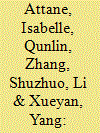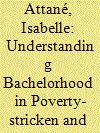|
|
|
Sort Order |
|
|
|
Items / Page
|
|
|
|
|
|
|
| Srl | Item |
| 1 |
ID:
124648


|
|
|
|
|
| Publication |
2013.
|
| Summary/Abstract |
Traditionally, marriage is a near universality in China. However, in the coming decades, owing to the growing sex imbalance, millions of men will be unable to marry. As a consequence, bachelorhood is becoming a new demographic concern, particularly affecting men from the most disadvantaged socio-economic groups. In China's cultural context today, heterosexual marriage remains a prerequisite for family formation and, in rural society particularly, the legitimate setting for sexual activity. Under such circumstances, bachelorhood is likely to produce privations on various fronts, the consequences of which for both the individual and the community are still largely unknown. This article focuses on the opinions and sexual behaviour of bachelors, and highlights significant variations from those of married men. It is based on the findings of an exploratory survey conducted in 2008 in selected villages in a rural county in Anhui province, referred to here as JC county. The survey provides insights into the more general situation of rural men unable to marry in a context of female shortage, and indicates the conditions a growing number of Chinese men will face in the near future.
|
|
|
|
|
|
|
|
|
|
|
|
|
|
|
|
| 2 |
ID:
169794


|
|
|
|
|
| Summary/Abstract |
Coupled with the social practice of female hypergamy, the male surplus within the never-married population means that today's Chinese marriage market is extremely tight in particular for men from a rural background and the least privileged socio-economic categories. Drawing on quantitative data from a survey conducted in 2014–2015, this article sheds light on the situation of single men who are past prime marriage age in three rural districts of Shaanxi particularly affected by this phenomenon. It compares single men's characteristics to those of their married counterparts and offers insights into the heterogeneity of single men with the aim of challenging some commonly accepted assumptions about bachelorhood in rural China. Results suggest a strong internalization of the various characteristics, centred on being able to offer social mobility to a potential wife, that a man is expected to have to be attractive to women in a context where women have more choice in mate selection. We conclude that mate selection is highly marked by class, social norms, social interactions, health, generation and age, and requires the mobilization of certain amounts of individual, social and economic resources. Unwanted bachelorhood would thus be better understood using an intersectional approach rather than mainly in numeric terms.
|
|
|
|
|
|
|
|
|
|
|
|
|
|
|
|
|
|
|
|
|